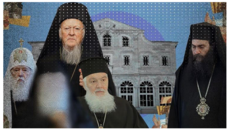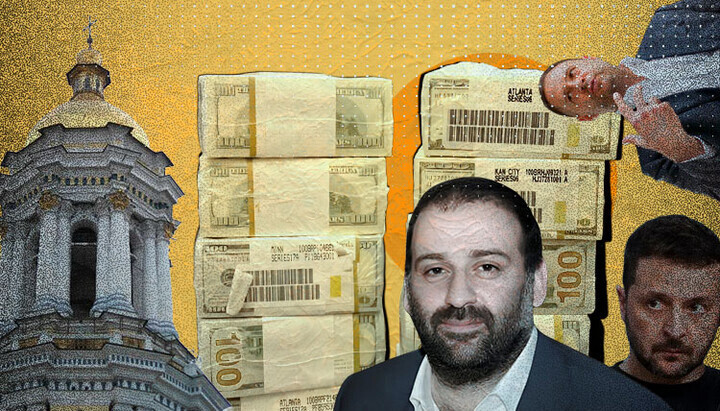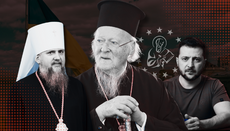Analysis: The ‘Appeal’ of Metropolitan Tikhikos and the Patriarchal Synod

The Synod of the Church of Constantinople is going to review the high-profile appeal of Metropolitan Tychikos, who was removed from the Paphos See by the Cypriot Synod. What decision will the Synod members of Constantinople make?
On August 29, 2025, the Holy Synod of the Patriarchate of Constantinople announced that it had examined the appeal (ἔκκλητον) of Metropolitan Tychikos of Paphos and invited him to personally appear at the next Synodal session, scheduled for October 17.
This decision immediately raised questions among many Orthodox Christians: What does this invitation mean? Does it indicate which way the Patriarchal Synod is leaning?
There is, of course, no simple answer. Yet it is worth exploring what possible scenarios await Metropolitan Tychikos and the Church of Cyprus — and what the invitation to the Phanar really signifies.
The outcome of the case of Metropolitan Tychikos — closely watched... across the Orthodox world — could either restore Constantinople’s credibility as an impartial arbiter, or further erode it.
The Appeal Procedure and the Test of Impartiality
Behind the case of the Metropolitan of Paphos lies a fundamental issue: the Patriarchate of Constantinople is attempting to affirm itself as the highest judicial authority in the Orthodox Church. It bases this claim on Canons 9 and 17 of the Fourth Ecumenical Council.
However, many Local Churches reject this interpretation, insisting that the Patriarch’s jurisdiction extends only to his own ecclesiastical territory and not to the internal affairs of other Churches.
This disagreement has deepened in recent decades following several controversial decisions by Constantinople that provoked crises — from internal disputes (such as the deposition of Patriarch Irenaios of Jerusalem) to pan-Orthodox conflicts (such as the rehabilitation of Filaret Denysenko and the recognition of “Metropolitan” Makariy Maletich, who had no canonical ordination).
Such actions inevitably raise among Orthodox believers the question: Is the Patriarch of Constantinople guided by Church canons and the good of the Church, or by political, historical, and personal considerations?
In this context, the “case of Metropolitan Tychikos” may become not only a test of the Patriarchate’s claimed prerogatives, but also a demonstration of its impartiality — its ability to render judgment not on the basis of sympathies or worldly alliances, but solely in accordance with the Holy Canons and the Tradition of the Church.
The Case of Filaret: A Historical Parallel
To understand this point, it is useful to recall why most Orthodox Churches reacted so sharply to Constantinople’s 2018 decision to lift the anathema from Filaret Denysenko — a move that seriously damaged Constantinople’s authority.
Even Patriarch Bartholomew himself later acknowledged this indirectly, saying that Constantinople “received nothing but suffering” from granting the Tomos of autocephaly to Ukraine.
On June 11, 1992, the Holy Synod of the Russian Orthodox Church deposed Metropolitan Filaret of Kyiv. Shortly thereafter, Filaret appealed (ἔκκλητον) to Constantinople and arrived personally at the Phanar.
In response, Patriarch Bartholomew sent two representatives to Moscow — Metropolitan John of Pergamon (Zizioulas) and Bishop Vsevolod of Skopelos (Maidansky), an ethnic Ukrainian — to investigate the matter on the spot.
On August 26, 1992, Bartholomew wrote to Patriarch Alexy II of Moscow (Letter No. 1203):
“The Holy Great Church of Christ fully recognizes the exclusive competence of Your Holy Church of Russia in this matter, accepts its conciliar decision, and does not wish to cause even the slightest difficulty to your brotherly Church.”
Later, on April 7, 1997, after the Russian Church had anathematized Filaret, Patriarch Bartholomew reaffirmed this stance in a second letter (No. 282), instructing the hierarchs of the Ecumenical Throne “to have no ecclesiastical communion” with Filaret and his associates.
Thus, the Patriarchate of Constantinople, having investigated the appeal in 1992, rejected it and fully recognized the Russian Church’s decision — effectively closing the case within 76 days.
For a quarter of a century thereafter, Constantinople regarded the so-called “Kyiv Patriarchate” (Filaret’s group) and the “Ukrainian Autocephalous Orthodox Church” (Makariy’s group) as deposed and schismatic.
But in 2018, Patriarch Bartholomew abruptly reversed course, recognizing both groups’ hierarchs as canonical — despite having repeatedly called Metropolitan Onuphry “the only canonical primate in Ukraine” as late as 2016.
Naturally, this reversal provoked widespread questions about motivation and credibility. Many Orthodox Churches now question the Patriarchate’s impartiality.
Therefore, the outcome of the “case of Metropolitan Tychikos” — closely watched not only in Cyprus and Greece but across the Orthodox world — will carry immense weight. It could either restore Constantinople’s credibility as an impartial arbiter, or further erode it.
The Invitation to the Phanar
Archbishop Georgios of Cyprus has repeatedly declared, both publicly and privately, that the “case of Tychikos” is already settled — that his removal will be confirmed by the October Synod, since (in his view) the Patriarchate “cannot go against the Church of Cyprus,” which has long supported it.
He has dismissed the invitation to Metropolitan Tychikos as merely “a formality.”
Yet is this truly the case?
First, a personal invitation and direct appearance before the Patriarchal Synod cannot be considered a formality. It indicates an intention to hear the accused side, clarify facts, and allow Synodal members to ask questions. This should be seen as the final and necessary stage of the appeal procedure, not a perfunctory gesture.
Second, the invitation itself signals that Constantinople recognizes the seriousness of the issue and understands that the credibility of its appeal process — and even its relations with other Churches — depend on how the case is resolved.
If the Patriarchate were simply to confirm the Cypriot Synod’s decision, which many regard as procedurally and canonically flawed, it would strengthen the arguments of those who question the legitimacy of Constantinople’s appellate authority.
Third, there is a legal dimension. After the Cypriot Synod’s May 22 decision and the submission of Tychikos’s appeal on June 5, debate arose as to whether the appeal suspended the decision’s effect. The Cypriot Church’s chancery claimed it did not, but Tychikos’s supporters — citing Church law — argued that he remains the canonical bishop of Paphos until the appeal is decided.
Thus, the Patriarchate must now clarify this ambiguity and, in doing so, establish a precedent (νομολογία) for future cases.
Fourth, the Phanar likely wishes to resolve the matter delicately, without damaging either its own authority or that of the Church of Cyprus. The invitation thus serves as a gesture toward dialogue and reconciliation.
Fifth, far from being a formality, the invitation implies a genuine judicial process. A superficial or politically motivated confirmation would only worsen the crisis and compromise Constantinople itself.
Why No Decision Yet — If “Everyone Knows Tikhikos Is Right”?
Even those involved in Metropolitan Tychikos’s removal acknowledge that it was procedurally irregular and non-canonical (αντικαταστατική). Violations of the Cypriot Church’s Charter are evident and undisputed — even by some within the Archbishopric.
So why no swift vindication?
a) The Synod of Constantinople wishes to show that it does not render judgment superficially or “based on appearances,” but only after a complete and thorough review. Otherwise, the Church of Cyprus might reject its decision, leading to deeper conflict.
b) The Patriarchate understands that the Tychikos case will directly affect the credibility of the ἔκκλητον — the right of appeal itself.
If within the community of Local Churches closely following the case, there arises the impression that the Patriarchate, for reasons of expediency (to avoid confrontation with the explosive Archbishop Georgios of Cyprus or to retain his support in inter-Orthodox relations), will confirm an unconstitutional decision and issue an unjust ruling against one of the hierarchs, this will demonstrate the futility of appeals by other bishops, priests, and laity who have suffered from illegal and uncanonical actions by their church leadership. Essentially, this will devalue and effectively nullify the “right to appeal”. Along with it, the Patriarchate will lose a significant part of its authority.
c) Finally, the Patriarchate may seek not only to “close the case” juridically but also to reconcile the parties for the sake of future coexistence. Hence, the personal hearing may also explore Tychikos’s willingness to accept a “formula of reconciliation.”
Possible Outcomes of the Synod
Predicting the Synod’s final decision is difficult, but several scenarios are conceivable:
- Full Rehabilitation – The most just and ecclesiastically sound option: the complete restoration of Metropolitan Tychikos as canonical Bishop of Paphos. This would uphold the Holy Canons but could strain relations with the Church of Cyprus.
- Partial Vindication with a Formula of Reconciliation – The Synod may recognize procedural violations, call on Cyprus to correct them, and invite both sides to a public act of reconciliation. Tychikos might be reinstated under “synodal supervision,” allowing both justice and diplomacy to prevail.
- Return of the Case to the Cypriot Synod – Constantinople could remit the matter for reconsideration, noting specific canonical violations and urging strict adherence to the Charter. This would reduce direct responsibility for the outcome but would require new participants, since the original Synodal members are disqualified by prior involvement.
- Confirmation of the Cypriot Decision – Theoretically possible, but unlikely. The personal summons of Tychikos and the long delay in issuing a verdict both suggest otherwise. Endorsing such a disputed judgment would provoke serious backlash from other Churches and from the faithful of Cyprus, most of whom sympathize with Tychikos.
What Constantinople Is Really Saying
By inviting Metropolitan Tychikos, the Ecumenical Patriarchate seems to be sending a message to the Archbishopric of Cyprus:
“We will not ignore the situation you have created — but we will not publicly humiliate you either.”
The gesture signals a call for dialogue and reconciliation. It also assures the faithful and the media that any decision will follow a transparent and just process, not “back-room deals.”
And it sends a message to Metropolitan Tychikos himself:
“We are ready to recognize that you are right in substance — if you help us express it in a way that allows everyone to save face.”
This suggests that a “formula of reconciliation” is already being prepared behind the scenes, with discreet consultations between the Phanar and Archbishop Georgios.
Conclusion
The summons of Metropolitan Tychikos to the Phanar should therefore not be seen as something negative or merely procedural. It is more likely a necessary step toward a political-canonical settlement.
The Ecumenical Patriarchate faces a difficult task: either to cut the Gordian knot of the Paphos affair or to untie it gently, preserving both justice and unity.
How it handles this case will show whether Constantinople can still serve as the impartial guardian of Orthodox conciliarity — or whether the trust once placed in it has been irrevocably lost.









